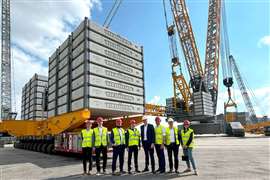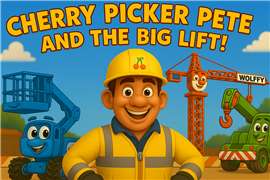Fork Truck Market Grows
25 March 2008
Some people refer to them as fork trucks while others know them as rigger trucks. Whatever you call them, these machines perform heavy duty lifting and moving for all sorts of industrial and manufacturing sector customers, and demand for them is growing.
Doral Equipment Rentals, based in Milwaukee, WI, (with hubs being set up on both coasts) is a specialty rental house that provides lifting solutions and is well known for its fork truck fleet. The company's fieet also includes hydraulic truck cranes and gantries. Doral Equipment carries Versa-Lift, Rigger-Lift and Yale branded fork trucks. The company owns some 60 fork trucks, and has 10 additional Versa-Lifts on order for delivery in 2007.
“We are one of the top suppliers of Versa-Lift brand fork trucks,” says Rob Keelan of Doral Equipment. “We offer the 25/35, 40/60 and 60/80 anywhere, anytime. We are adding more trucks this year to put Doral Equipment Rentals at the top of the fork truck market.”
Often described as “a forklift on steroids,” fork trucks fill an important gap in the specialized heavy lift sector in industrial and plant settings. Fork or rigger trucks have been available for about 30 years, and their popularity has grown as manufacturers design machines to meet customers’ specific needs. Today's rigger trucks have large capacity - 30,000 to 200,000 pounds - and are built on a compact frame allowing them to maneuver in tight spaces.
A rigger truck's versatility can be increased with attachments. Most units are purchased with forks and a boom or jib. Forks allow an operator to pick up cargo from underneath, while the boom allows the operator to pick up items from above. The Machines are ideal for installing and moving printing presses and related equipment.
Doral rents fork trucks to trade shows, especially those related to printing presses and the graphic arts industries. “Some of our past jobs have included a six Versa-Lift rental to a tradeshow venue,” Keelan says. “Our trucks were used for setting up the show which was showcasing large press equipment. Three Versa-Lift 25/35 and three 40/60s were used.
“A good fit for the trucks we have found is our customers at power plants,” he says. “These customers find the high capacity and compactness of the Versa-Lift models to be invaluable for heavy picks in tight spaces you find in power plants.”
Another regular Doral customer is the world famous Ladish Co. Keelan says, “We currently have a Versa-Lift 60/80 and Rigger-Lift R120 working on rebuilding the biggest counter blow forge hammers in the world.”
Fork trucks are ideal for work on large-scale jobs, and they are an asset on small everyday machine moves, Keelan says, from “moving a small press or CNC equipment to loading steel coils and bars to be processed.”
The canning industry and paper mill industry are also sold on fork trucks, Keelan says. The Machines help with maintenance on heavy machinery and for moving raw stock around in a plant. Other customers include paper mills, aerospace factories and battery plants. Doral has shipped these machines throughout North America.
There are a variety of rigger or fork truck styles and models. Solid cushion-tired fork trucks tend to be smaller capacity and are mainly used in indoor industrial settings.
With a smaller pressure footprint, the solid pneumatic-tired forklifts are slightly larger but can run on soft or rough terrain.
Michael Salter at Rigger Xtreme says that the market for rigger trucks grew in 2006. “I find the market is growing quite strongly for 2007, both in the US and the world,” he says. “So far it has been one of our busiest years.”
Salter says that the benefits of fork trucks for the machinery moving sector tends to be size with large picking capacities. “These machines are quite powerful, yet can fit into the tight areas of a factory allowing machinery movers to move large objects with ease like presses,” he says.
Salter says his company targets two markets. “There are two main industries I find,” he says. “The largest is the machinery moving markets, which uses the forklifts on many different jobs in many different locations. The second industry is manufacturing, where the manufacturer purchases a machine for their own personal use, such as moving large stamping dies.”
Rigger Xtreme recently developed a new carriage design that allows an operator to remove the entire carriage to use a boom and or jib instead of removing the forks, which offers time and labor savings and also increases the boom and jib capacity
STAY CONNECTED


Receive the information you need when you need it through our world-leading magazines, newsletters and daily briefings.
CONNECT WITH THE TEAM











